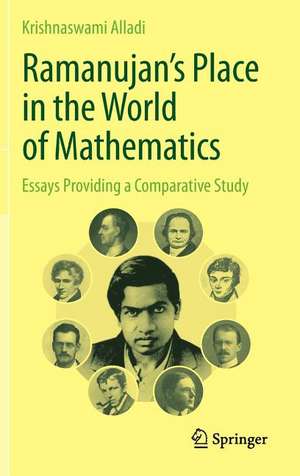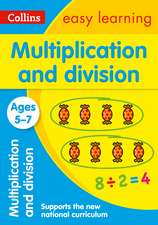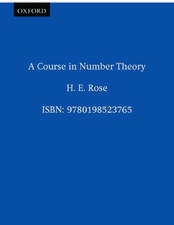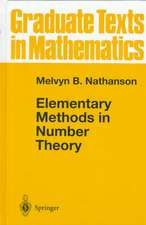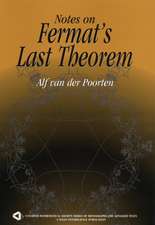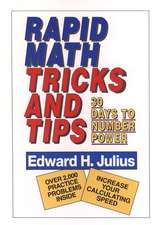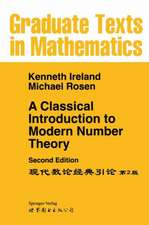Ramanujan's Place in the World of Mathematics: Essays Providing a Comparative Study
Autor Krishnaswami Alladien Limba Engleză Hardback – 31 oct 2012
| Toate formatele și edițiile | Preț | Express |
|---|---|---|
| Paperback (1) | 586.88 lei 3-5 săpt. | |
| Springer Nature Singapore – 18 sep 2022 | 586.88 lei 3-5 săpt. | |
| Hardback (2) | 359.79 lei 38-44 zile | |
| Springer Nature Singapore – 18 sep 2021 | 734.27 lei 3-5 săpt. | |
| Springer India – 31 oct 2012 | 359.79 lei 38-44 zile |
Preț: 359.79 lei
Nou
Puncte Express: 540
Preț estimativ în valută:
68.86€ • 71.62$ • 56.84£
68.86€ • 71.62$ • 56.84£
Carte tipărită la comandă
Livrare economică 10-16 aprilie
Preluare comenzi: 021 569.72.76
Specificații
ISBN-13: 9788132207665
ISBN-10: 8132207661
Pagini: 196
Ilustrații: XVIII, 178 p.
Dimensiuni: 155 x 235 x 16 mm
Greutate: 0.41 kg
Ediția:2013
Editura: Springer India
Colecția Springer
Locul publicării:New Delhi, India
ISBN-10: 8132207661
Pagini: 196
Ilustrații: XVIII, 178 p.
Dimensiuni: 155 x 235 x 16 mm
Greutate: 0.41 kg
Ediția:2013
Editura: Springer India
Colecția Springer
Locul publicării:New Delhi, India
Public țintă
Popular/generalCuprins
Foreword (by George Andrews).- Preface.- Part I: Ramanujan and other mathematical luminaries.- Chapter 1: Ramanujan - an estimation.- Chapter 2: Ramanujan - the second century.- Chapter 3: L. J. Rogers - a contemporary of Ramanujan.- Chapter 4: P. A. MacMahon - Ramanujan's distinguished contemporary.- Chapter 5: Fermat and Ramanujan - a comparison.- Chapter 6: J. J. Sylvester - Ramanujan's illustrious predecessor.- Chapter 7: Erdos and Ramanujan - legends of twentieth century mathematics.- Chapter 8: C. G. J. Jacobi - algorist par-excellence.- Chapter 9: Evariste Galois - founder of group theory.- Chapter 10: Leonhard Euler - most prolific mathematician in history.- Chapter 11: G. H. Hardy - Ramanujan's mentor.- Chapter 12: J. E. Littlewood - Ramanujan's contemporary and Hardy's collaborator.- Chapter 13: Neils Henrik Abel - Norwegian mathematical genius.- Chapter 14: Issai Schur - Ramanujan's German contemporary.- Chapter 15: Robert Rankin - Scottish link with Ramanujan.- Part II: Onsome aspects of Ramanujan's mathematics.- Chapter 16: Ramanujan and pi.- Chapter 17: Ramanujan and partitions.- Chapter 18: Major progress on a problem of Ramanujan.- Part III: Reviews.- Chapter 19: Review of “Srinivasa Ramanujan: The Lost Notebook and other unpublished papers”.- Chapter 20: Review of “The man who knew infinity - book by Robert Kanigel”.- Chapter 21: Review of “Ramanujan: Letters and Commentary - book by Bruce Berndt and Robert Rankin”.- Chapter 22: Review of “Ramanujan: Essays and Surveys - book by Bruce Berndt and Robert Rankin”.- Chapter 23: Review of “Partitions - a play on Ramanujan”.- Part IV: Preserving Ramanujan's legacy.- Chapter 24: The Ramanujan Journal - its conception, need and place.- Chapter 25: A pilgrimage to Ramanujan's hometown.- Chapter 26: The first SASTRA Ramanujan prizes.- Chapter 27: Ramanujan's growing influence.- Index.
Recenzii
From the reviews:
“One of the best ways to understand Ramanujan and his mathematics is to study his life and work in comparison to other outstanding mathematicians in history whose lives and works have things in common with Ramanujan. Some of them, like Ramanujan, underwent great difficulties in life but, undeterred by these obstacles, produced work of the highest quality. After providing an evaluation of Ramanujan and discussing the possible impact of his work in the years following his centenary, there is a collection of essays on 13 mathematical luminaries that provides a comparative study. These essays are really the heart of the book….As [George] Andrews writes in his Foreword: “Alladi, who has worked in several areas of number theory and analysis, and who, as the editor of The Ramanujan Journal, is uniquely qualified to write these historical sketches which provide an unusual and compelling view of Ramanujan.” The book is an enlightening study of Ramanujan as a mathematician and as a human being and will appeal to mathematicians, students and the general public interested in mathematics.”
—Themistocles M. Rassias, EMS Newsletter March 2013
“It is in fact a great book to go swimming in. Alladi has put together a sweeping compendium of essays on Ramanujan … . It is a wonderful book to browse through, and before you know it, you’ll have read it all. … All in all, this book is clearly entirely irresistible. Get a copy for yourself. … You can’t miss.” (Michael Berg, MAA Reviews, January, 2013)
“It is a unique book and can be read effortlessly even by non-mathematicians. Each article can be read separately. … strongly recommends this book to each and every one irrespective of their area of work and interest and also to school teachers and students. To sum up, it is an excellent book, highly enjoyable and easily readable.” (Girish Kumar Ramaiah, Zentralblatt MATH, Vol. 1257, 2013)
“One of the best ways to understand Ramanujan and his mathematics is to study his life and work in comparison to other outstanding mathematicians in history whose lives and works have things in common with Ramanujan. Some of them, like Ramanujan, underwent great difficulties in life but, undeterred by these obstacles, produced work of the highest quality. After providing an evaluation of Ramanujan and discussing the possible impact of his work in the years following his centenary, there is a collection of essays on 13 mathematical luminaries that provides a comparative study. These essays are really the heart of the book….As [George] Andrews writes in his Foreword: “Alladi, who has worked in several areas of number theory and analysis, and who, as the editor of The Ramanujan Journal, is uniquely qualified to write these historical sketches which provide an unusual and compelling view of Ramanujan.” The book is an enlightening study of Ramanujan as a mathematician and as a human being and will appeal to mathematicians, students and the general public interested in mathematics.”
—Themistocles M. Rassias, EMS Newsletter March 2013
“It is in fact a great book to go swimming in. Alladi has put together a sweeping compendium of essays on Ramanujan … . It is a wonderful book to browse through, and before you know it, you’ll have read it all. … All in all, this book is clearly entirely irresistible. Get a copy for yourself. … You can’t miss.” (Michael Berg, MAA Reviews, January, 2013)
“It is a unique book and can be read effortlessly even by non-mathematicians. Each article can be read separately. … strongly recommends this book to each and every one irrespective of their area of work and interest and also to school teachers and students. To sum up, it is an excellent book, highly enjoyable and easily readable.” (Girish Kumar Ramaiah, Zentralblatt MATH, Vol. 1257, 2013)
Notă biografică
Krishnaswami Alladi is professor of mathematics at the University of Florida, where he was the department chairman during 1998–2008. He received his PhD from the University of California in 1978. His research area is number theory, where he has made notable contributions. In 1987, during the Ramanujan Centennial in India, he got the inspiration to launch The Ramanujan Journal (now published by Springer), devoted to all areas of research influenced by Ramanujan. He annually writes articles about Ramanujan and his place in the world of mathematics, being published in several national dailies. He is presently editor-in-chief of The Ramanujan Journal, editor of the book series Developments in Mathematics (Springer), and associated editor of Notices of the American Mathematical Society.
Textul de pe ultima copertă
This book is a collection of articles, all by the author, on the Indian mathematical genius Srinivasa Ramanujan as well as on some of the greatest mathematicians in history whose lives and works have things in common with Ramanujan. It presents a unique comparative study of Ramanujan’s spectacular discoveries and remarkable life with the monumental contributions of various mathematical luminaries, some of whom, like Ramanujan, overcame great difficulties in life. Also, among the articles are reviews of three important books on Ramanujan’s mathematics and life. In addition, some aspects of Ramanujan’s contributions, such as his remarkable formulae for the number π, his pathbreaking work in the theory of partitions, and his fundamental observations on quadratic forms, are discussed. Finally, the book describes various current efforts to ensure that the legacy of Ramanujan will be preserved and continue to thrive in the future. Thus the book is an enlightening study of Ramanujan as a mathematician and a human being.
From the Foreword by George Andrews—one of the greatest experts on Ramanujan's work: “Alladi, who has worked in several areas of number theory and analysis, and who, as editor of the Ramanujan Journal, is uniquely qualified to write these historical sketches which provide an unusual and compelling view of Ramanujan.”
ABOUT THE AUTHOR
Krishnaswami Alladi is professor of mathematics at the University of Florida, where he was the department chairman during 1998–2008. He received his PhD from the University of California, Los Angeles, in 1978. His research area is number theory, where he has made notable contributions. In 1987, during the Ramanujan Centennial in India, he got the inspiration to launch The Ramanujan Journal (now published by Springer), devoted to all areas of mathematics influenced by Ramanujan. He annually writes articles about Ramanujan and his place in the world of mathematics, for journals and newspapers. He is presently editor-in-chief of The Ramanujan Journal, editor of the book series Developments in Mathematics (Springer), and associate editor of Notices of the American Mathematical Society.
From the Foreword by George Andrews—one of the greatest experts on Ramanujan's work: “Alladi, who has worked in several areas of number theory and analysis, and who, as editor of the Ramanujan Journal, is uniquely qualified to write these historical sketches which provide an unusual and compelling view of Ramanujan.”
ABOUT THE AUTHOR
Krishnaswami Alladi is professor of mathematics at the University of Florida, where he was the department chairman during 1998–2008. He received his PhD from the University of California, Los Angeles, in 1978. His research area is number theory, where he has made notable contributions. In 1987, during the Ramanujan Centennial in India, he got the inspiration to launch The Ramanujan Journal (now published by Springer), devoted to all areas of mathematics influenced by Ramanujan. He annually writes articles about Ramanujan and his place in the world of mathematics, for journals and newspapers. He is presently editor-in-chief of The Ramanujan Journal, editor of the book series Developments in Mathematics (Springer), and associate editor of Notices of the American Mathematical Society.
Caracteristici
Encourages bright students to pursue mathematics and exposes them to the enchanting world of Ramanujan Introduces many aspects of Ramanujan’s mathematics and compares his work with other great mathematicians throughout history Appeals to the readers by presenting the life and work of not only Ramanujan but also of many other mathematical luminaries Includes supplementary material: sn.pub/extras
